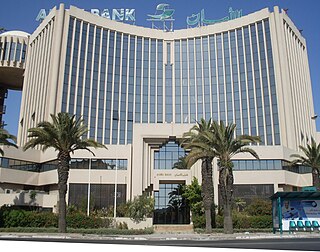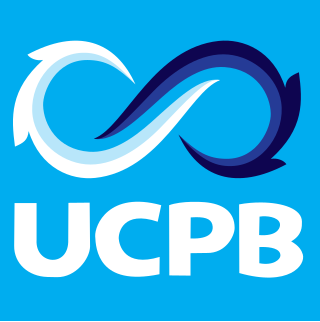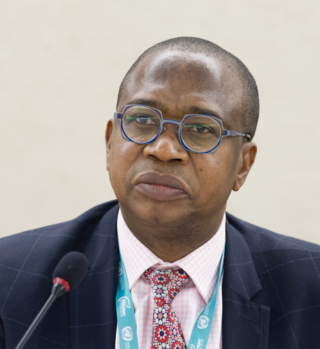
The economy of Tunisia is in the process of being liberalized after decades of heavy state direction and participation in the country's economy. Prudent economic and fiscal planning has resulted in moderate but sustained growth for over a decade. Tunisia's economic growth historically has depended on oil, phosphates, agri-food products, car parts manufacturing, and tourism. In the World Economic Forum Global Competitiveness Report for 2015–2016, Tunisia ranks in 92nd place.

A ministry of finance is a ministry or other government agency in charge of government finance, fiscal policy, and financial regulation. It is headed by a finance minister, an executive or cabinet position.

The economy of Africa consists of the trade, industry, agriculture, and human resources of the continent. As of 2019, approximately 1.3 billion people were living in 53 countries in Africa. Africa is a resource-rich continent. Recent growth has been due to growth in sales, commodities, services, and manufacturing. West Africa, East Africa, Central Africa and Southern Africa in particular, are expected to reach a combined GDP of $29 trillion by 2050.

China Development Bank (CDB) is a policy bank of China under the State Council. Established in 1994, it has been described as the engine that powers the national government's economic development policies. It has raised funds for numerous large-scale infrastructure projects, including the Three Gorges Dam and the Shanghai Pudong International Airport.

The Development Bank of the Philippines (DBP) is a state-owned development bank headquartered in Makati, Philippines. It is primarily tasked to provide banking services to cater to the needs of agricultural and industrial enterprises. It has 146 branches including 14 branch lite units.

Land Bank of the Philippines, is a government-owned bank in the Philippines with a special focus on serving the needs of farmers and fishermen. While it provides the services of a universal bank, it is officially classified as a "specialized government bank" with a universal banking license.

Ngozi Okonjo-Iweala is a Nigerian economist, who has been serving as the Director-General of the World Trade Organization since March 2021. She is the first woman and first African to lead the World Trade Organization as Director-General.

Tito Titus Mboweni was a South African politician who served as Minister of Finance of South Africa in the government of President Cyril Ramaphosa from 2018 to 2021.
A soft loan is a loan with a below-market rate of interest. This is also known as soft financing. Sometimes, soft loans provide other concessions to borrowers, such as long repayment periods or interest holidays. Soft loans are usually provided by governments to projects they think are worthwhile. The World Bank and other development institutions provide soft loans to developing countries.

The United Coconut Planters Bank, more popularly known by its initials, UCPB, or by its old name, Cocobank, was a government-owned bank and was one of the largest banks in the Philippines, having ranked within the top twenty banks in the country in terms of assets. It was the only existing universal bank not listed on the Philippine Stock Exchange. The bank, owing to its name, catered heavily to coconut farmers, but also served a wide-ranging clientele.
An international financial institution (IFI) is a financial institution that has been established by more than one country, and hence is subject to international law. Its owners or shareholders are generally national governments, although other international institutions and other organizations occasionally figure as shareholders. The most prominent IFIs are creations of multiple nations, although some bilateral financial institutions exist and are technically IFIs. The best known IFIs were established after World War II to assist in the reconstruction of Europe and provide mechanisms for international cooperation in managing the global financial system.

The Development Bank of Southern Africa (DBSA) is a development finance institution wholly owned by the Government of South Africa. The bank intends to "accelerate sustainable socio-economic development in the Southern African Development Community (SADC) by driving financial and non-financial investments in the social and economic infrastructure sectors".
The Export–Import Bank of China is a policy bank of China under the State Council. Established in 1994, the bank was chartered to implement the state policies in industry, foreign trade, economy, and foreign aid to other developing countries, and provide policy financial support so as to promote the export of Chinese products and services.
The Uganda Development Bank Limited (UDBL) is a government-owned development financial institution in Uganda.

Agricultural Development Bank of Ghana, commonly known as Agricultural Development Bank or ADB, is a government-owned development and commercial bank in Ghana. The bank is the first development finance institution established by the Government of Ghana. It is the developmental finance institution that provides technical and financial services to agribusiness, farmers, and other enterprises at the rural communities. It is one of the commercial banks licensed by the Bank of Ghana, the national banking regulator.

Mthuli Ncube, is the Finance Minister in the Zimbabwe cabinet appointed by president Emmerson Mnangagwa and past chief economist and Vice President of the African Development Bank. He holds a PhD in Mathematical Finance from Cambridge University. On 7 September 2018, President Emmerson Mnangagwa announced Zimbabwe's new cabinet where he named Professor Mthuli Ncube as the Finance Minister.
Filinvest Development Corporation is the publicly listed holding company for the various firms in the Filinvest group. It was established in 1955 in the Philippines by Andrew L. Gotianun Sr. and his wife, Mercedes Gotianun, as a used-car financing company. It has holdings in real estate development and leasing, the sales of housing units, and hotel and resort management, banking and financial services, sugar and power. It is based in Metro Manila, Philippines, and is owned by the Gotianun family.
In South Africa the Department of Public Enterprises is the shareholder representative of the South African Government with oversight responsibility for state-owned enterprises in key sectors. Some companies are not directly controlled by the Department of Public Enterprises, but by various other departments. Further, not all state owned entities are registered as companies.













